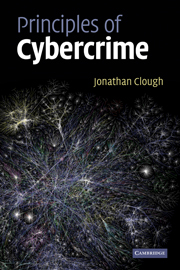Book contents
- Frontmatter
- Contents
- Preface
- Acknowledgements
- List of abbreviations
- Table of cases
- Table of legislation
- PART I Introduction
- PART II Computer as target
- PART III Fraud and related offences
- 7 Fraud
- 8 Criminal copyright infringement
- 9 ‘Spam’
- PART IV Content-related offences
- PART V Offences against the person
- PART VI Jurisdiction
- Bibliography
- Index
9 - ‘Spam’
Published online by Cambridge University Press: 05 June 2012
- Frontmatter
- Contents
- Preface
- Acknowledgements
- List of abbreviations
- Table of cases
- Table of legislation
- PART I Introduction
- PART II Computer as target
- PART III Fraud and related offences
- 7 Fraud
- 8 Criminal copyright infringement
- 9 ‘Spam’
- PART IV Content-related offences
- PART V Offences against the person
- PART VI Jurisdiction
- Bibliography
- Index
Summary
Electronic junk mail
It is the sense of Congress that…Spam has become the method of choice for those who distribute pornography, perpetrate fraudulent schemes, and introduce viruses, worms, and Trojan horses into personal and business computer systems.
No one with an email account could fail to be aware of the problem of unsolicited emails, more commonly known as ‘spam’. While it may be thought to be more annoyance than crime, the volume and sophistication of spam is such that it has gone from ‘being a minor nuisance to becoming a significant social and economic issue’. Modern communication networks provide spammers with a potential global audience of millions at negligible cost, giving rise to a number of significant concerns.
First, spam undermines the convenience and efficiency of email for legitimate users. Filtering software is imperfect and may return false-positives. A full inbox may refuse further emails. Wanted emails may therefore be blocked or ‘lost, overlooked, or discarded’ amidst the larger volume of spam. The numbing barrage of internet advertising and fear of Internet scams may create a general sense of distrust of electronic commerce. The use of forged email addresses may lead to legitimate server operations being blacklisted by anti-spam services, or the unwitting owner of the spoofed address being bombarded by thousands of bounced messages. Although primarily associated with email, spam is becoming increasingly prevalent in other networks, for example the sending of spam SMS/MMS over wireless networks.
- Type
- Chapter
- Information
- Principles of Cybercrime , pp. 232 - 244Publisher: Cambridge University PressPrint publication year: 2010



